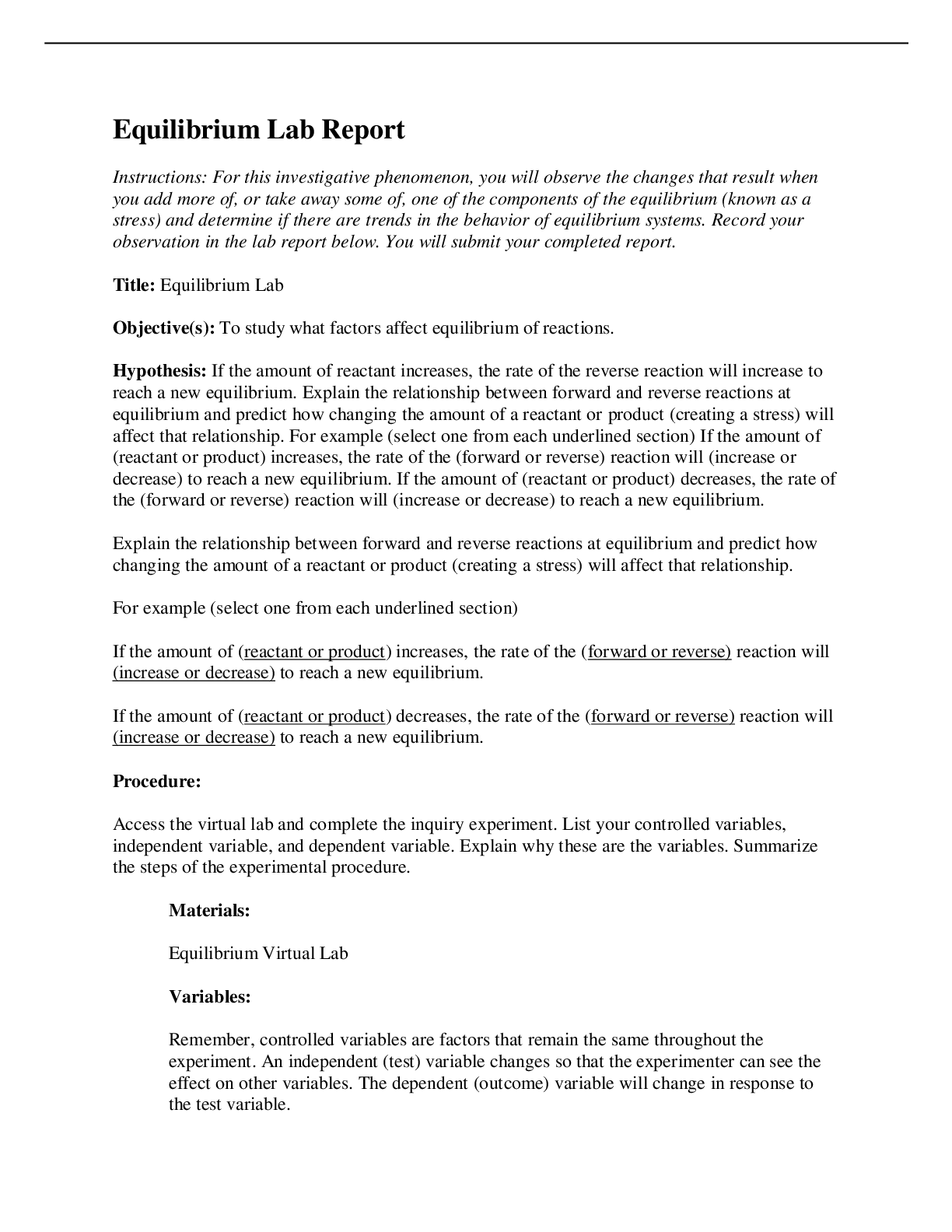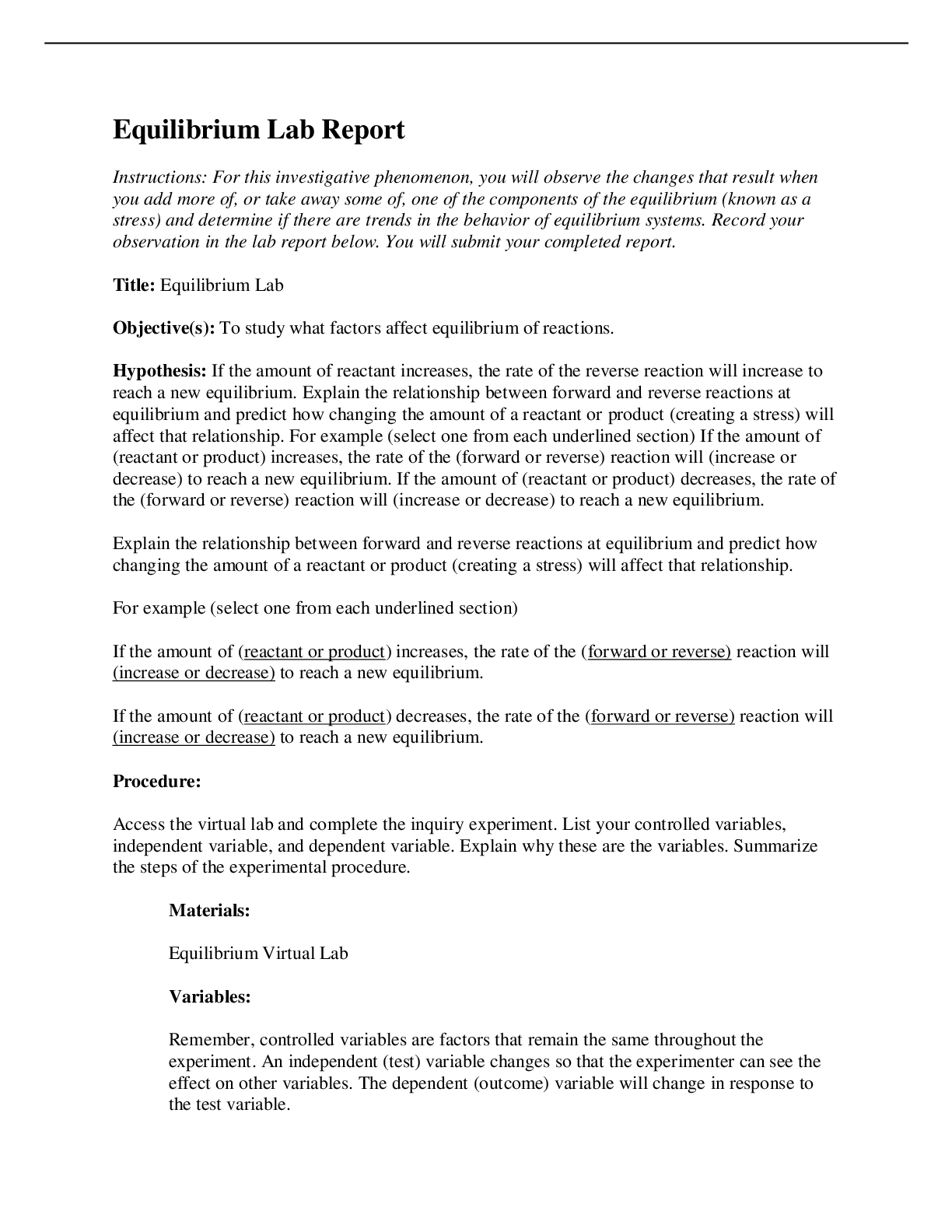Instructions: For this investigative phenomenon, you will observe the changes that result when
you add more of, or take away some of, one of the components of the equilibrium (known as a
stress) and determine if there are trends in the behavior of equilibrium systems. Record your
observation in the lab report below. You will submit your completed report.
Title: Equilibrium Lab
Objective(s): To study what factors affect equilibrium of reactions.
Hypothesis: If the amount of reactant increases, the rate of the reverse reaction will increase to
reach a new equilibrium. Explain the relationship between forward and reverse reactions at
equilibrium and predict how changing the amount of a reactant or product (creating a stress) will
affect that relationship. For example (select one from each underlined section) If the amount of
(reactant or product) increases, the rate of the (forward or reverse) reaction will (increase or
decrease) to reach a new equilibrium. If the amount of (reactant or product) decreases, the rate of
the (forward or reverse) reaction will (increase or decrease) to reach a new equilibrium.
Explain the relationship between forward and reverse reactions at equilibrium and predict how
changing the amount of a reactant or product (creating a stress) will affect that relationship.
For example (select one from each underlined section)
If the amount of (reactant or product) increases, the rate of the (forward or reverse) reaction will
(increase or decrease) to reach a new equilibrium.
If the amount of (reactant or product) decreases, the rate of the (forward or reverse) reaction will
(increase or decrease) to reach a new equilibrium.
Procedure:
Access the virtual lab and complete the inquiry experiment. List your controlled variables,
independent variable, and dependent variable. Explain why these are the variables. Summarize
the steps of the experimental procedure.
Materials:
Equilibrium Virtual Lab
Variables:
Remember, controlled variables are factors that remain the same throughout the
experiment. An independent (test) variable changes so that the experimenter can see the
effect on other variables. The dependent (outcome) variable will change in response to
the test variable.
Controlled variables: amount of chemicals added and amount of solutions
Independent variable: what is added to solutions
Dependent variable: color of solutions
Summary of Steps:
Include a summary of steps here. We have included the first two important steps to get
you started. You can summarize the rest from the virtual lab.
1. Select each control test tube to compare the concentrations of the reactants and
products. Then record this data
2. Get you 4 test tubes of Co(H2O) 6 2+ and CoCl4 2- at approximately equal
concentrations.
3. Add a solution of HCI to test tube 1, stir with clean, dry stirring rod. Record the color
change and graph data.
4. Take test tube 1 and add a solution of AgNO3 . Stir with a clean, dry stirring rod.
Record the color change and graph data.
5. Add liquid H2O to test tube 2. Stir with a clean, dry stirring rod. Record the color
change and graph data.
6. Add NaCl salt to test tube 3. Stir with a clean, dry stirring rod. Record the color change
and graph data.
7. Add liquid H2O to test tube 3. Stir with a clean, dry stirring rod. Record the color
change and graph data
8. Add solid CaCl2 salt to test tube 2. Stir with a clean, dry stirring rod. Record the color
change and graph data.
1. Write down the equilibrium equation you are investigating using the information
provided by the introduction within the virtual lab activity
Equilibrium reaction: CO(H2O) 6 2+ + 4Cl ⇋ COCl4 2- + 6H2O
2. Select each control test tube to compare the concentrations of reactants and
products. Write down what each indicator color means about the concentrations of
reactants and products in solution.
Pink means: When there is significantly more Co(H2O) 6 2+ than CoCl4 2- in the
test tube, the solution is pink, as in the control test tube A.
Read More


